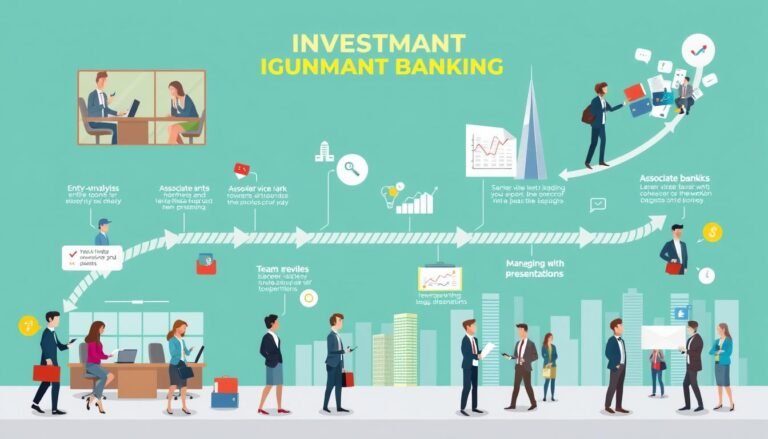Networking 101: A Guide for Building Relationships in the Finance Industry
Have you ever wondered why some finance pros seem to get job offers and deals easily? Others with similar skills struggle.
Networking is key to career success and growth in finance. It opens doors to hidden jobs and connects you with leaders for advice. It’s about building personal relationships, not just having a lot of contacts.
Building real relationships is better than just collecting names. The finance world’s networking involves events and social media like LinkedIn. This guide will teach you how to grow your finance career through networking. You’ll learn how to improve your personal brand and connect with important people.
Whether you’re new or experienced, learning about networking can change your career in finance.
Key Takeaways
- Networking is essential for uncovering job opportunities that are not publicly advertised.
- Effective networking connects you with mentors and industry leaders for career advancement.
- Staying updated on industry trends through networking enhances professional development.
- Building personal relationships is more impactful than having a large number of contacts.
- Social media platforms, especially LinkedIn, are vital tools for finance industry networking.
- Following up with potential connections within 24-48 hours is key for maintaining relationships.
- Leveraging CRM systems like Salesforce, Zoho CRM, and HubSpot CRM can optimize contact management.
Importance of Networking in the Finance Industry
Networking is key for finance pros looking to move up and stay successful. In a tough field, strong professional ties can make all the difference. Investment banking, with its focus on who you know, is especially important.
Why Networking Matters
About 70–80 percent of jobs are never advertised. They’re found through who you know and referrals. For finance folks, a good connection can boost your hiring chances by 40%.
Building Professional Connections
Yet, many have cut back on networking since the pandemic. Women and frontline workers have seen their networks shrink. But, finance is full of chances for those who network:
- Networking boosts team work and efficiency, as McKinsey found.
- It opens doors to new projects, mentors, and job leads.
- It offers support and advice when you’re down.
A strong network is crucial for handling unexpected changes. By networking, finance pros can grow their careers and get noticed in the industry.
Understanding Networking Events
Networking events are key for building relationships and learning about the finance industry. They offer many chances to meet people with different goals. Let’s explore the types of networking events and how to get ready for them.
Types of Networking Events
Finance pros can attend several types of networking events:
- Conferences and Seminars: These events are perfect for meeting industry experts. Speaking at them can boost your credibility and attract new contacts.
- Virtual Networking: Sites like LinkedIn and Slack communities let you network online. This is great when you can’t be there in person.
- Volunteering Activities: Helping out in finance-related programs can open up big networking chances. It also shows your leadership skills.
- Informational Interviews: Reaching out to finance pros through emails or calls can start valuable conversations.
- Local Meetups: Meetup.com helps find local financial gatherings. These are casual places to meet peers.
- Professional Associations: Joining finance groups offers a place for networking and growing your career.
How to Prepare for Networking Events
Getting ready is key to making the most of networking events. Here are some steps to help you prepare:
- Research the Event: Learn about the venue, dress code, and who’s attending. Knowing the event helps set your goals for meeting people.
- Create an Elevator Pitch: A short, impressive pitch is crucial for making a good impression.
- Set Clear Goals: Decide what you want to get from the event. It could be meeting mentors, advisors, or learning finance insights.
- Prepare Business Cards: Always have plenty of business cards to share with new contacts.
- Follow-Up: After the event, it’s important to stay in touch with new contacts. This keeps your network strong.
By knowing about different networking events and preparing well, finance pros can build strong relationships. These relationships help grow their careers.
| Networking Event Type | Benefits | Platform/Approach |
|---|---|---|
| Conferences and Seminars | Industry insights, potential speaking opportunities | Annual events, finance forums |
| Virtual Networking | Convenience, global reach | LinkedIn, Slack communities |
| Volunteering Activities | Community leadership, local exposure | Non-profit boards, local events |
| Informational Interviews | Personalized industry insights | Cold emailing, calling professionals |
Effective Communication Skills for Networking
In the finance sector, good communication skills are key for networking success. They help share complex financial ideas and build strong professional ties. Knowing how to speak and listen well can greatly improve your connections with clients and colleagues.
Verbal Communication
Verbal communication is vital for clearly sharing financial ideas. In the finance world, being clear with complex data is crucial. With practice and feedback, you can get better at presenting and negotiating, leading to more effective talks.
- Clear and concise explanations: Avoid jargon and simplify terms when possible.
- Confident delivery: Maintain eye contact and use appropriate body language to convey professionalism.
- Engagement: Ask questions and invite feedback to ensure understanding.
Written Communication
Good written communication is also essential in finance. Whether it’s reports, emails, or presentations, clarity is key. Your written messages should be clear and focused, tailored to your audience.
- Be concise: Focus on the main points and relevant data.
- Proofread thoroughly: Ensure there are no errors that could undermine your credibility.
- Use visual aids: Charts and graphs can help illustrate your points more effectively.
Active Listening
Active listening is crucial in finance networking. It’s not just about hearing but understanding what clients and colleagues say. This skill helps build trust and stronger relationships, leading to better teamwork and collaboration.
- Show empathy: Acknowledge the speaker’s points and offer thoughtful responses.
- Nonverbal cues: Use nods, smiles, and appropriate eye contact to convey attentiveness.
- Follow up: Recap important points to ensure mutual understanding.
| Tip | Strategy | Benefit |
|---|---|---|
| Engage in Active Listening | Use verbal and nonverbal cues | Builds rapport and understanding |
| Practice Public Speaking | Join groups like Toastmasters | Improves confidence and articulation |
| Seek Feedback | Request evaluations from peers | Identifies areas for improvement |
Building Your Personal Brand
In the finance world, personal branding is key to standing out. It shows your skills and values, helping you move up in your career. Financial analysts need a degree in finance or accounting. Investment bankers require a degree in finance or economics, plus work experience.
Even non-business degrees can be valuable. They show analytical skills that finance values.
Importance of Personal Branding
Personal branding in finance means showing a consistent professional image. Employers look for analytical skills, attention to detail, and a strong work ethic. Soft skills like communication and teamwork are also important.
Being consistent in your message is crucial. A strong personal brand takes time to build but can be lost quickly.
Crafted elevator pitches can make networking more successful. Being kind also greatly impacts how you’re seen. Kindness or unkindness can leave lasting impressions on your professional image.
Tips to Enhance Your Personal Brand
- Clarity in Communication: Make sure your words and writing are clear and professional. This boosts your personal branding in finance.
- Active Listening: Listening well to others can help you improve your career branding strategies.
- Nonverbal Cues: Work on your body language and nonverbal communication to enhance your professional image.
- Inclusive Public Speaking: Speak up in public to establish a strong voice and unique perspective in the industry.
- Learning and Feedback: Keep learning from others and seek feedback to refine your personal brand.
- Networking Events: Going to events can make you more visible. Actively engaging on LinkedIn can also boost your networking success.
- Connecting with Others: Building a network means engaging positively with colleagues and clients. Connecting with past coworkers on LinkedIn can expand your network.
To maintain a strong personal brand, you must be good at what you do. Being seen as incompetent can harm your reputation. Focus on problem-solving, attention to detail, and clear communication to keep your professional image strong.
Networking 101: A Guide for Building Relationships in the Finance Industry
Networking is key to success in finance. Up to 80% of jobs are not advertised, making networking crucial. It can open doors to new roles, mentorships, and partnerships.
Networking events and conferences are great for growing your network. They let you meet people from different backgrounds. This can give you new ideas and help you reach more clients.
About 70% of finance pros prefer meeting in person over online. This shows how important face-to-face connections are in finance.
Business cards are a must-have at these events. Finance pros usually order 100 to 200 cards. After the event, sending personalized emails within 48 hours helps build real connections.
Online platforms like LinkedIn and Twitter are also key for networking. They help you connect globally and build your personal brand. Over 80% of professionals say networking is vital for career growth in finance.
Real networking leads to lasting relationships that help your business grow. 95% of finance pros believe in building genuine connections. Being yourself can make a big difference in forming lasting partnerships.
It’s also important to have clear goals for networking. Whether it’s finding clients, mentors, or partners, knowing what you want helps. Going to events outside finance can also expand your network and opportunities.
In short, networking is about making real connections in finance. By following a good networking guide, finance pros can boost their careers and personal brands.
Approaching and Engaging with Strangers
Starting conversations with strangers at networking events takes confidence and strategy. Look for people standing alone for an easier start. Joining group talks can also help. Tailor your icebreakers to the event or their interests to spark meaningful chats. It’s key to keep talks brief so everyone can participate fully.
Icebreakers and Conversation Starters
Effective icebreakers and starters are great for meeting new people. Here are some tips:
- Comment on the event: Talk about something specific at the event you’re both at.
- Ask about their profession: Asking about their job is a natural way to start talking.
- Compliment or observe: Personal compliments or comments on the setting can also work well.
The aim is to start conversations that feel natural and let the other person share.
Keeping Conversations Short and Engaging
It’s crucial to keep discussions brief but interesting. This keeps your partner interested. Here’s how:
- Stay relevant: Talk about topics you both find interesting, ensuring the conversation stays engaging.
- Listen actively: Show you’re really listening to what they say.
- Be concise: Share your thoughts clearly and briefly.
By keeping talks short and interesting, you’re more likely to make a good impression. This can lead to more connections in the future.
| Statistics | Insights |
|---|---|
| Job vacancies filled through personal connections | A significant proportion |
| Networking skills | Can be developed with practice and perseverance |
| Young companies using Twitch | 74% |
| WhatsApp users worldwide | Over 2 billion |
Utilizing Social Media for Networking
In today’s world, social media is key for finance pros. Sites like LinkedIn, Facebook, and TikTok are huge. They help finance fans meet peers, share tips, and grow their brand.
Best Platforms for Finance Professionals
LinkedIn is top for finance pros, with over 950 million users. It’s great for networking and finding new jobs. Facebook has 3 billion users, offering many ways to share content. TikTok, with a billion users, is great for short, fun finance videos.
How to Engage on Social Media
To network well on social media, start with a professional profile. Share industry news to show you know your stuff. Join in on discussions to reach more people.
Check how well you’re doing on social media often. Try new ads to get better results. This way, you can improve and make more money.
Also, use social media for virtual events. Keep in touch with your followers on different sites. Make sure your content fits each platform to connect with your audience better.
Following Up After Networking Events
Getting through a networking event is just the start. To turn those first contacts into lasting professional ties, a quick and smart follow-up is key. Here are some top tips for keeping in touch after the event.
Effective Follow-Up Strategies
Timing is everything in networking follow-ups. A finance survey showed 95% of pros say to follow up within 24 hours. This shows you’re serious and interested. Make your messages personal by recalling specific talks or shared moments from the event.
Using LinkedIn to reach out is a smart move; 80% of investment bankers say it’s great for growing your network. When you invite someone, remind them of your meeting with a photo or video. A handwritten note can also boost your chances of a reply by 70%.
Maintaining Long-Term Connections
Building lasting professional bonds takes ongoing effort and real interest. Keep in touch by sharing your career wins and asking about theirs. This keeps you on their radar and shows you care. Investment bankers say charity events are great for networking; try to attend these to reconnect.
Here’s a table showing how different follow-up actions stack up:
| Follow-Up Activity | Effectiveness Rate (%) |
|---|---|
| Responding within 24 hours | 95% |
| Connecting on LinkedIn | 80% |
| Sending personalized emails | 85% |
| Attending charity events | 90% |
| Handwritten notes | 70% |
Leveraging Alumni Networks and Professional Associations
Connecting with alumni networks and finance associations can boost your career. These groups offer great chances to use your alumni network and meet new people. They also provide access to special events, workshops, and job listings. This part will show you how to find and join these networks.
Finding Alumni Networks
Start by using university platforms to find alumni networks. Universities have strong networks for finance pros. For example, Harvard Business School’s network is huge and active. You can also use LinkedIn to stay in touch and learn about new trends.
- Alumni engagement significance: It’s key for fundraising, marketing, and networking.
- Networking: It helps students and alumni find mentors and partners.
- Tailored engagement: Schools focus on recent grads and big donors to meet their needs.
Joining Professional Associations
Being part of finance associations is also great. Groups like the CFA Institute or the American Finance Association help you grow. They offer career advice, training, and networking chances that are vital for moving up.
These groups also have events online and offline. For example, the CFA Institute’s annual conference is a big deal for finance pros. It’s a chance to share ideas and learn about new trends.
Also, professional finance associations have mentorship programs. They pair newbies with experienced pros for advice and learning. Joining these groups lets you learn from the best and give back, too.
In short, using alumni network utilization or joining professional finance associations opens big doors. By getting involved, you can make important connections and move your finance career forward.
Cold Emailing and Cold Calling
Cold emailing and cold calling are key in the finance world. They help professionals grow and find new partners. With the right strategies, finance experts can connect with potential clients and partners.
Effective Cold Email Strategies
Cold emailing works well in finance because people often use email. Here are some tips to make your emails stand out:
- Send emails mid-week: Emails sent from Tuesday to Thursday get more opens.
- Timing is key: Emails sent between 8 AM and 10 AM in the recipient’s time zone work best.
- Follow-up swiftly: Send networking emails within 24 to 48 hours after an event.
- Subject lines matter: Grab attention with clear and relevant subject lines.
- Personalization: Personal emails can boost open rates by up to 26%. Mention recent achievements or connections.
- Brevity: Keep emails short with 3-5 paragraphs. Use bullet points for key points.
Mastering the Art of Cold Calling
Cold calling is tough but can pay off with the right approach. Here are some tips for finance outreach:
- Preparation: Know your potential client well. Tailor your pitch to their needs.
- Script development: Create a clear, engaging script. Talk about benefits and be ready for objections.
- Active listening: Engage by listening and asking questions.
- Follow-up: Send a personalized email after the call. Keep the momentum going.
| Technique | Tip | Benefit |
|---|---|---|
| Email Timing | Send between 8 AM and 10 AM | Higher engagement |
| Follow-up Emails | Within 24-48 hours post-event | Maintains momentum |
| Personalization | Mention mutual connections or achievements | Increases credibility |
| Cold Calling Scripts | Develop concise and tailored scripts | More engaging and relevant pitch |
| Active Listening | Use open-ended questions | Better prospect engagement |
Avoiding Common Networking Mistakes
In the finance world, networking is key for growth. Yet, many fall into common traps that slow them down. It’s vital to know and dodge these networking pitfalls to make real connections and move up in your career.
Overcoming Common Pitfalls
Being too self-promotional is a big mistake. It’s better to share your wins and really listen to others. Also, not following up after events can harm your connections. Quick and thoughtful follow-ups are essential.
Another error is using only digital channels like LinkedIn for talking. While they’re helpful, they shouldn’t replace face-to-face talks.
Learning from Networking Mistakes
Getting feedback and thinking about your networking is crucial for getting better. By learning from lessons in finance networking, you can dodge common mistakes and get better at networking. Introverts, who are great at deep connections, can use special strategies to shine at events.
For example, 70% of successful entrepreneurs are introverts. This shows introverted finance folks can do well, even if it’s tough at first. Knowing your strengths can help you feel less anxious and have better talks.
Getting Out of Your Comfort Zone
Building a strong professional network means stepping out of comfort zones. It’s about making connections in fields you’re not familiar with. This approach can lead to new opportunities and fresh ideas. Here are some ways to do it.
Attending Non-Finance Events
Going to events outside your field is key. Tech conferences, healthcare seminars, and art exhibits are great places to start. They offer new views and chances to work together.
For example, the ICMA Annual Conference in Portland is a good place to meet people from different fields. It’s not just about finance events. Events with diverse groups can spark creativity and lead to partnerships across industries.
Expanding Your Network Horizontally
Horizontal networking is about connecting with peers, not just bosses. It helps build a strong support system and opens up collaboration chances. LinkedIn is a great tool for this.
Start by linking with colleagues from other departments and people you meet at non-finance events. Focus on building real relationships through personal communication, not just sending out messages.
Interdisciplinary networking is more than just career growth. It’s about sparking innovation and teamwork. By stepping out of your comfort zone, you can grow your network and make lasting professional connections.
The Role of Mentorship in Networking
Mentorship makes networking better by sharing experiences and knowledge. Getting into finance mentorship gives you personal advice. It helps you grow professionally and meet more people in your field. Mentorships also create lasting connections that help your career a lot.
Finding a Mentor
Finding the right mentor can change your career for the better. Here’s how to do it:
- Know what you want from a mentor
- Look in places like professional groups and events
- Choose mentors based on their experience and how well you get along
When asking someone to be your mentor, make a good first impression. Explain what you need, suggest when to meet, and tell them what to do next.
Becoming a Mentor
Being a mentor is also very rewarding. It helps you grow professionally and earns you respect in your field. Here are some tips:
- Be involved with your mentees and give them helpful advice
- Share your knowledge and introduce them to your network
- Make sure to meet regularly and talk about how to grow in your career
This way of peer guidance in finance through mentorship builds a strong network. It shows how important networking through mentorship is in the finance world.
| Tips for Mentees | Tips for Mentors |
|---|---|
| Define goals clearly | Engage actively |
| Search in relevant places | Provide constructive feedback |
| Evaluate potential mentors | Share industry insights |
| Be specific about needs | Commit to regular meetings |
Networking for Career Advancement
Networking is key for moving up in your career, especially in finance. It opens doors to new job opportunities and uses your connections to help you grow. Building relationships inside and outside your company can greatly boost your career.
Networking for Job Opportunities
Networking is essential for finding jobs in investment banking. Many jobs come through referrals from people you know. This field values strong connections for getting the inside scoop.
Going to industry events and conferences is a great way to meet important people. Having a strong LinkedIn profile and reaching out personally can also help you get noticed.
Alumni networks are also a big help in finding jobs. They connect you with top schools. Plus, informational interviews can teach you about the industry and help you make connections.
Networking Within Your Organization
Networking inside your company is just as important. Sharing your work and achievements can make you stand out. This could lead to promotions or new roles.
Using social media and attending career fairs can also help you meet people. Following up after these events can leave a good impression.
By using these methods, you can find new job opportunities and move up in your finance career.
Conclusion
Networking in the finance world is a journey that needs constant learning and being open to change. This guide has shown how important and varied building professional connections can be. You can meet people at events, use alumni networks, or connect on social media like LinkedIn.
There are many chances to meet others in banking, investment, and insurance. Learning to talk and write well, being active on social media, and following up after events are key. These steps help you build a strong network that supports your job and future goals.
Building good relationships is about being real, consistent, and willing to try new things. This guide has given many insights on networking. It’s not just about meeting new people but also about growing together in the finance world.
As you grow your network, remember it can greatly improve your career. It sets the stage for a successful and rewarding career in finance.
Source Links
- Business networking 101: Essential Tools and Guide | KADO
- Networking 101: The Yuppie’s Guide to Professional Connections – FasterCapital
- Why You Need to Expand Your Professional Network
- How Leaders Create and Use Networks
- 11 networking in finance tips: Building your circle
- Networking 101: How to Connect with Investment Bankers and Build Your Career | Leland
- Mastering Communication Skills for Finance Professionals: A Comprehensive Guide
- Business networking 101: Essential Tools and Guide | KADO
- Breaking Into Finance: How to Network and Build Relationships with a Non-Business Degree | Leland
- Networking & building your personal brand
- Networking 101: What To Do At Your First Networking Event
- The Art of Networking: How to Build Meaningful Connections
- The Art of Networking: Building Meaningful Connections in the Business World
- Networking Tips for the Reluctant Professional
- How to Grow Your Professional Network
- Networking on the Network
- Social Media in Financial Services: Best Practices & Examples | Sprinklr
- Investment Banking Networking: How to Win Interviews and Offers
- Joe Apfelbaum on LinkedIn: #networking #followup #relationships #business #newyork… | 35 comments
- From Informational Interviews to Networking Events: How to Expand Your Investment Banking Network | Leland
- A complete guide to alumni engagement: Strategies, implementation and best practices
- 9 Tips to Leverage Developer Alumni Networks for Career Growth
- How to Use Your College Alumni Network for Success
- A Guide to Effective Cold Email Networking in 2024 – Growbots
- Cold Email Potential Partners: 7 Proven Strategies for Business Success – Growleady
- Networking 101 for introverts: 10 tips to help you connect with confidence
- Business Networking – Tips, Tricks, and Techniques
- How to build your network
- How to Meet Amazing People and Build a Bulletproof Network [Ultimate Guide]
- IDEALS: Stepping Outside Your Comfort Zone
- Mentorship and Networking: How to Build Powerful Business Connections for Success
- The Power of Networking
- How to Network Like a Pro and Land Your Dream Investment Banking Job | Leland
- The Art of Networking: Building Bridges for Professional Growth and Success
- Importance and Components of the Financial Services Sector
- The Relationship Between Networking, LinkedIn Use, and Retrieving Informational Benefits








